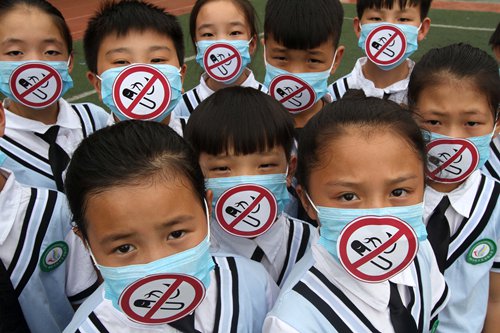
Students of the Feixiang District Experimental Primary School wear masks with no-smoking signs on May 31, in Handan, North China's Hebei Province. (Photo: IC)
A local government's decision to reverse its ban and allow indoors smoking areas has lit up a fiery public debate with activist groups calling the move "a setback for society's efforts to ban smoking in public places."
The government in Hangzhou, East China's Zhejiang Province, plans to amend the law, saying enforcing bans in all public spaces is too difficult and unrealistic, news site zjol.com reported last week.
The Hangzhou government began collecting public opinion on the amendment in May.
Before the amendment, Hangzhou did not allow smoking in public places such as hospitals and schools.
The change angered the Chinese Association on Tobacco Control, a government body.
"We did not suggest a complete ban in Hangzhou nine years ago, because we wanted the city to take baby steps. However, if Hangzhou still allows smoking indoors, that would be no progress at all compared to nine years ago," Xu Guihua, an expert working with the organization told the Global Times on Wednesday.
Although Hangzhou raised the maximum fine from 2,000 yuan ($309) to 20,000 yuan, Xu said it is beside the point. "Fine is not our purpose. Teaching people not to smoke indoors is," she noted.
Xu believes indoor smoking areas cannot prevent the habit at all.
"During a field trip to Hangzhou this year, I found that although some places have smoking areas, the doors were left open, so it did not make much of a difference," Xu said.
Right to say no
Hangzhou was one of the first group of Chinese cities to introduce a ban on smoking in public.
Currently 18 cities in the country have adopted local legislation on tobacco control - including Beijing's Smoke-free Law which came into force on June 1, 2015, China Global Television Network reported in May.
The law, by far the toughest of its kind in China, meets the WHO requirements and has been described as the "strongest smoking ban in history."
"Everyone, smoker or non-smoker, has the right to ask someone to put out his cigarette in public venues," said Wu Yiqun, vice director of the Beijing-based anti-smoking advocacy group think tank.
"Finally, it is support for national tobacco control and for those who have the courage to say no to second-hand smoke," she said.
Hangzhou's Center of Inspection and Supervision conducted a survey in 2016, six years after the city started a cigarette ban, which showed that 112 out of 225 respondents wanted a complete ban on smoking in public.
"Sometimes I smell cigarette smoke in our office, so I deliberately shout out 'who smoked?', and the embarrassed smokers put out their cigarettes," Xu Muzi, a Hangzhou resident told the Global Times.
Money matters
Experts note that the money tobacco companies make is one of the major reasons that make it hard to ban smoking in public.
"The tobacco companies will gang up to boycott measures that regulate public smoking, because these harm their interest," said an expert.
The State-owned China National Tobacco Corporation reportedly amassed more than 1.1 trillion yuan in profit in 2016 — about as much as China's four major banks and two major gasoline companies combined — according to a We-media article, citing data released by Fortune China in 2017.
The number could not be verified by the Global Times. However, according to the official website of the China National Tobacco Corporation, Chinese tobacco generated a total of 1.11 trillion yuan in taxes and profits in 2017.
Xu said lack of regulation is also the culprit encouraging public smoking in many cities.
"Because law enforcement officers cannot monitor all public venues all the time, many volunteers are hired for free but they sometimes do not pay attention to the job."
The public can also report violations via a supervision hotline, Wu said.
According to a survey by the Beijing Patriotic Health Campaign Committee in 2015, the Association on Tobacco Control, an NGO, and 163.com, a news portal, over 60 percent of 100,000 respondents said they will take action against smokers who flout the ban.


